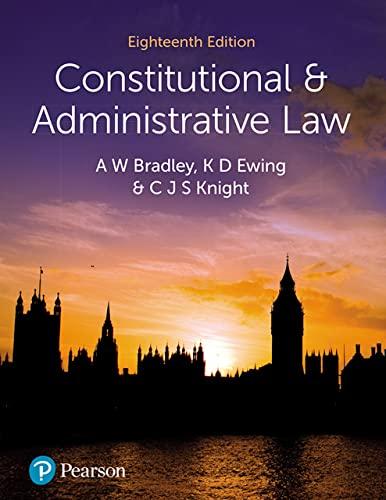Question
Please reply to the inquiry by the reference with an understanding Issue: What overarching issue was the court addressing or resolving (one questions not a
Please reply to the inquiry by the reference with an understanding
Issue: What overarching issue was the court addressing or resolving (one questions not a paragraph just one sentence encapsulating)
Facts: What are the facts that the court described and cared about?
facts section should only include the actual facts of the case.
Rule of Law:What rule please mention the statue, case, legal principle mention did the court apply
*rule of law segment should only constitutional amendments or cases the Court applies the facts USE PRECEDENT
Application- how did the court apply the rule to the facts?
*application section should be how the Court applied the facts to the law
Conclusion: what result did the court reach and WHY?
Schreiber v. California
The officer in the present case, however, might reasonably have believed that he was confronted with an emergency, in which the delay necessary to obtain a warrant, under the circumstances, threatened 'the destruction of evidence,'. We are told that the percentage of alcohol in the blood begins to diminish shortly after drinking stops, as the body functions to eliminate it from the system. Particularly in a case such as this, where time had to be taken to bring the accused to a hospital and to investigate the scene of the accident, there was no time to seek out a magistrate and secure a warrant. Given these special facts, we conclude that the attempt to secure evidence of blood-alcohol content in this case was an appropriate incident to the petitioner's arrest.
Similarly, we are satisfied that the test chosen to measure petitioner's blood-alcohol level was a reasonable one. Extraction fo blood samples for testing is a highly effective means of determining the degree to which a person under the influence of alcohol. Such tests are commonplace in these days of periodic physical examination and experience with them teaches that the quantity of blood extrated is minimal, and that for most people procedure involves virtually no, risk trauma or pain. Petitioner is not one of hte few who on grounds of fear, concern for health or religious scruple might prefer some other means of testing, such as the "Breathalyzer" test petitioner refuses, see n 9, supra. We need not to decide whether such wishes would have to be respected.
Finally, the record shows that the test was performed in a reasonable manner. Petitioner's blood was taken by a physician in a hospital environment according to accepted medical practices. We are thus not presented with the serious questions which would arise if a search involving use of a medical technique, even of the mostrudimentary sort, were made by other than medical personnel or in other than a medical environment - for example, if it were administered by police in the privacy of the stationhouse. To tolerate searches under these conditions might be to invite an unjustified element of personal risk of infection and pain.
We thus conclude that the present record shows no violation of petitioner's right under the Fourth and Fourteenth Amendments to be free of unreasonable searches and seizures. It bears repeating, however, that we reach this judgment only on the facts of the present record. The integrity of an individual's person is a cherished value of our society. That we today hold that the Constitution does not forbid the States minor intrusions into an individual's body under stringently limited conditions in no way indicates that it permits more substantial intrusions, or intrusions under other conditions.
Affirmed
Step by Step Solution
There are 3 Steps involved in it
Step: 1

Get Instant Access to Expert-Tailored Solutions
See step-by-step solutions with expert insights and AI powered tools for academic success
Step: 2

Step: 3

Ace Your Homework with AI
Get the answers you need in no time with our AI-driven, step-by-step assistance
Get Started


